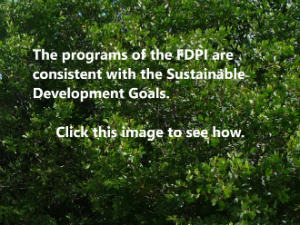In a 1994 speech on effective public administration for local government systems, the late Professor Edwin Jones shared what he considered to be the role of public administration in building “… macro organizational capacities, to ensure co-operation among organizations and to steer such organizations toward effective problem-solving via collective decision making.” He suggested that the actions of public administration “… to reconcile conflicting interests and values, as well as promote equity and accountability” implied the need for more governance, not more government.
As defined by Professor Jones, “…governance is a participative process in which individuals, groups, communities and authorities combine in collective decision-making to re-design policies and institutions and to clarify their mutual roles and responsibilities in implementation. At the most basic level, then, governance relates to ways in which society solves its problems collectively, using government merely as one instrument in that process.” (Joint Trade Unions Research Development Centre 1994, pp 33-37)
The conceptualization of governance proffered by Professor Jones implies that: (i) societal problems are solved primarily through collective action; and (ii) government is only one actor in collective decision making. In effect, while government facilitates good governance, society is ultimately responsible for collective decision making to solve complex social problems.
Professor Jones (in the 1994 speech) also underscored the need for capacity building to address challenges resulting from an increase in the pace and types of change faced by Caribbean countries.
The reality of constant disruption and challenges has arrived, and the need for collective action is more apparent.
Collective action, or collaboration as it is more widely known, is a broad term that covers many types of joint efforts; partnerships and networks between individuals, between individuals and institutions, and between institutions. However, most collaborations are not designed specifically to solve social problems. Kania and Kramer (2011) identify five types of collaboration between organizations that are intended to solve social problems, noting that most fail because they lack the essential elements that ensure success. The authors make the point that most major social problems result from the interplay of government and commercial/private interests, and thus no single organization can solve major social problems by itself. The authors recommend a form of collaboration termed Collective Impact.
The difference between collective impact processes and most forms of collaboration is said to be the systematic approach that defines the relationship between organizations in meeting shared objectives. Kania and Kramer identify five elements that must be present in collective impact processes in order to achieve success. The five elements are: “a common agenda, shared measurement systems, mutually reinforcing activities, continuous communication, and backbone support organizations.” The increasing use of collective impact processes has resulted in the establishment of an online forum that provides insights and materials to support the process.
The Foundation for Development Planning, Inc. (FDPI) collaborates with institutions in the three social sectors in implementation of its Program of Work. Specifically, the FDPI’s public engagement strategy includes a focus on collective impact processes.
References
Collective Impact Forum: https://www.collectiveimpactforum.org/resources/collective-insights-collective-impact
John Kania & Mark Kramer. (2011). “Collective Impact”. Stanford Social Innovation Review, Winter 2011, pp 36-41. Website <https://ssir.org/articles/entry/collective_impact>. Accessed: March 5, 2021.
Joint Trade Unions Research Development Centre. (1994). “Report of Seminar/Workshop on Physical Planning and Sustainable Development”. Portland, Jamaica, September 9-10, 1994. Joint Trade Unions Research Development Centre, Kingston, Jamaica.
Editor’s Note
Lloyd Gardner is the Principal of Environmental Support Services, LLC and President of the Foundation for Development Planning, Inc.
The perspectives and positions in the article are solely those of the author(s), and do not reflect the views or positions of the Foundation for Development Planning, Inc., its board of directors, its staff, its associates, or its partners.

No Comments Yet - be the First!